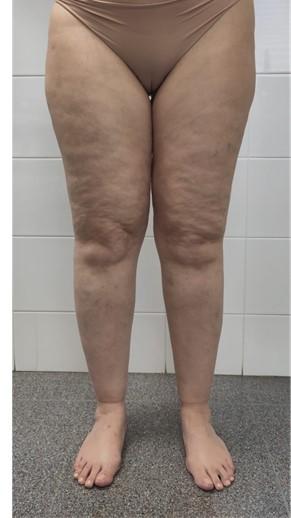About Lipoedema
What is lipoedema?
Lipoedema is a long-term (chronic) condition caused by an abnormal accumulation of fat under the skin.
It most commonly affects the lower body (legs, thighs and buttocks), sometimes it can occur in the arms also. The condition can cause painful swelling in the affected limbs and, if not carefully managed, can severely impact upon daily life.
The majority of people diagnosed with the condition are female. It is estimated over 10% of women in the UK are living with the condition.
Lipoedema usually affects both sides of the body equally.
Lipoedema can make the bottom, thighs, lower legs and sometimes arms look out of proportion with the rest of the body.
Other symptoms include pain, tenderness or heaviness in the affected limbs. Those affected may find they bruise more easily also.
Lipoedema affects people differently; some people have mild symptoms, others have more severe symptoms that are physically and mentally debilitating. Ongoing treatment and support are essential.
Lipoedema, type III, stage 1. Image credit: Jmarchn, CC BY 4.0 https://creativecommons.org/licenses/by/4.0, via Wikimedia Commons.
What causes lipoedema?
The cause of lipoedema is unknown. Around 60% of people living with the condition have a close family member who also suffers from lipoedema, so it is thought there is a genetic link.
It's not caused by being overweight – you can be a healthy weight and still get it.
It may be caused by changes in your hormones:
- during puberty
- when you're pregnant
- when you're going through the menopause
- when you're taking the contraceptive pill
Other possible causes of limb swelling
There are other things that can cause large or swollen limbs.
If a person experiences swelling in all or part of a limb or another part of the body, it could be lymphoedema. This can affect any part of the body, but usually develops in the arms or legs and is caused by the lymphatic system not working properly.
Sometimes, a build-up of fluid can cause the legs, ankles or feet to become swollen. This is called oedema. In lipoedema, the feet are not usually affected.
Diagnosis
If you think you are experiencing symptoms of lipoedema, please see your GP as soon as possible.
If you are suffering from swollen legs, ankles, feet or arms for any reason and the swelling has not improved after a few days, please see your GP.
If your leg(s) or arm(s) become swollen, red, hot and painful and you have flu-like symptoms, please urgently seek medical attention. You may have cellulitis (a skin infection) and need treatment with antibiotics. You can call the NHS on 111 24 hours a day or get help from 111 online.
How can lipoedema be treated?
If you have been diagnosed with lipoedema, the GP may refer you to a specialist clinic for treatment.
There's currently no cure, but there are things that can help manage the symptoms and stop it getting worse.
Treatment will depend on how severe your symptoms are and how they're affecting you.
The main treatments are:
- eating healthily, doing more exercise and trying to maintain a healthy weight.
- wearing compression stockings or bandages to reduce pain and discomfort, and make it easier for you to walk.
- looking after your skin – for example, by regularly using moisturising cream (emollients) to stop your skin drying out.
- counselling or cognitive behavioural therapy (CBT) if you're finding it difficult to cope with your symptoms and you feel depressed.
- a procedure to get rid of the fat (liposuction) if your symptoms are particularly severe – you may need more than one operation and it may not be available on the NHS.
Compression therapy as a treatment
Compression therapy can help to reduce some of the swelling symptoms caused by lipoedema. Wearing compression stockings or bandages regularly can also help to reduce pain and discomfort, and make it easier to walk.
A specially trained clinician will assess you and recommend the most suitable type of compression. For more information about the benefits of compression therapy, read our 5-minute guide here.
Further information & support
Lipoedema is a long-term (chronic) incurable condition and it can affect some people severely, both physically and mentally.
If lipoedema is affecting your quality of life, talking to someone and seeking further support can help.
Further information on lipoedema, its symptoms and treatments, can be found on the NHS website.
For further support, please contact Lipoedema UK and/or Talk Lipoedema. Both charities offer lots of help and advice about managing lipoedema. They can also help you make contact with others who are living with the condition.
